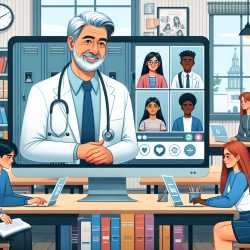The COVID-19 pandemic has been a defining moment for healthcare professionals (HCPs) worldwide. As frontline warriors, they have faced unprecedented challenges, not just in terms of patient care but also in managing their own emotional well-being. A recent study titled "Global and Local Trends Affecting the Experience of US and UK Healthcare Professionals during COVID-19: Twitter Text Analysis" provides valuable insights into the experiences and emotional states of HCPs during this crisis. This blog explores how practitioners can harness these insights to enhance their skills and improve healthcare delivery.
The Power of Social Media in Healthcare
Social media platforms like Twitter have emerged as vital tools for understanding public sentiment and professional discourse during emergencies. The study analyzed tweets from over 25,000 HCPs in the US and UK to uncover common themes and emotions expressed during the pandemic. These findings highlight the potential of social media as a real-time barometer for public health responses.
Key Findings from the Study
- Common Challenges: HCPs in both countries faced similar health and social issues related to the pandemic, reflected in their discussions and emotional expressions.
- Emotional Display: Negative emotions such as fear, anger, and sadness increased significantly during the pandemic. Interestingly, British HCPs exhibited more positive sentiment across all topics compared to their American counterparts.
- Political Discourse: Political discussions were prevalent among HCPs, with significant spikes following major events like George Floyd's death and the US elections.
Improving Practitioner Skills through Emotional Intelligence
The study underscores the importance of emotional intelligence (EI) in healthcare settings. Understanding and managing emotions can significantly impact patient care, communication, and decision-making processes. Here are some ways practitioners can enhance their EI:
- Self-awareness: Regularly reflect on your emotional responses to various situations. This self-awareness can help you manage stress and improve interactions with colleagues and patients.
- Empathy: Practice empathy by actively listening to patients' concerns and validating their feelings. Empathy fosters trust and strengthens patient-practitioner relationships.
- Communication Skills: Enhance your communication skills by being mindful of your tone, body language, and choice of words. Effective communication is crucial for delivering quality care.
The Role of Social Media in Enhancing Healthcare Delivery
The insights gained from social media analysis can inform healthcare policies and interventions. By monitoring online discourse, practitioners can identify emerging health trends and respond proactively. Additionally, social media platforms can serve as educational tools for disseminating accurate health information to the public.
Encouraging Further Research
The study highlights the need for ongoing research into the long-term effects of the pandemic on HCPs' well-being. Future studies should explore positive changes such as post-traumatic growth among practitioners. Understanding these dynamics can lead to more comprehensive support systems for HCPs.
To read the original research paper, please follow this link: Global and Local Trends Affecting the Experience of US and UK Healthcare Professionals during COVID-19: Twitter Text Analysis.
Conclusion
The COVID-19 pandemic has underscored the critical role of HCPs in navigating public health crises. By leveraging insights from social media discourse, practitioners can enhance their skills and contribute to more effective healthcare delivery. Emotional intelligence remains a key component in this journey, enabling HCPs to connect with patients on a deeper level and foster resilient healthcare systems.










